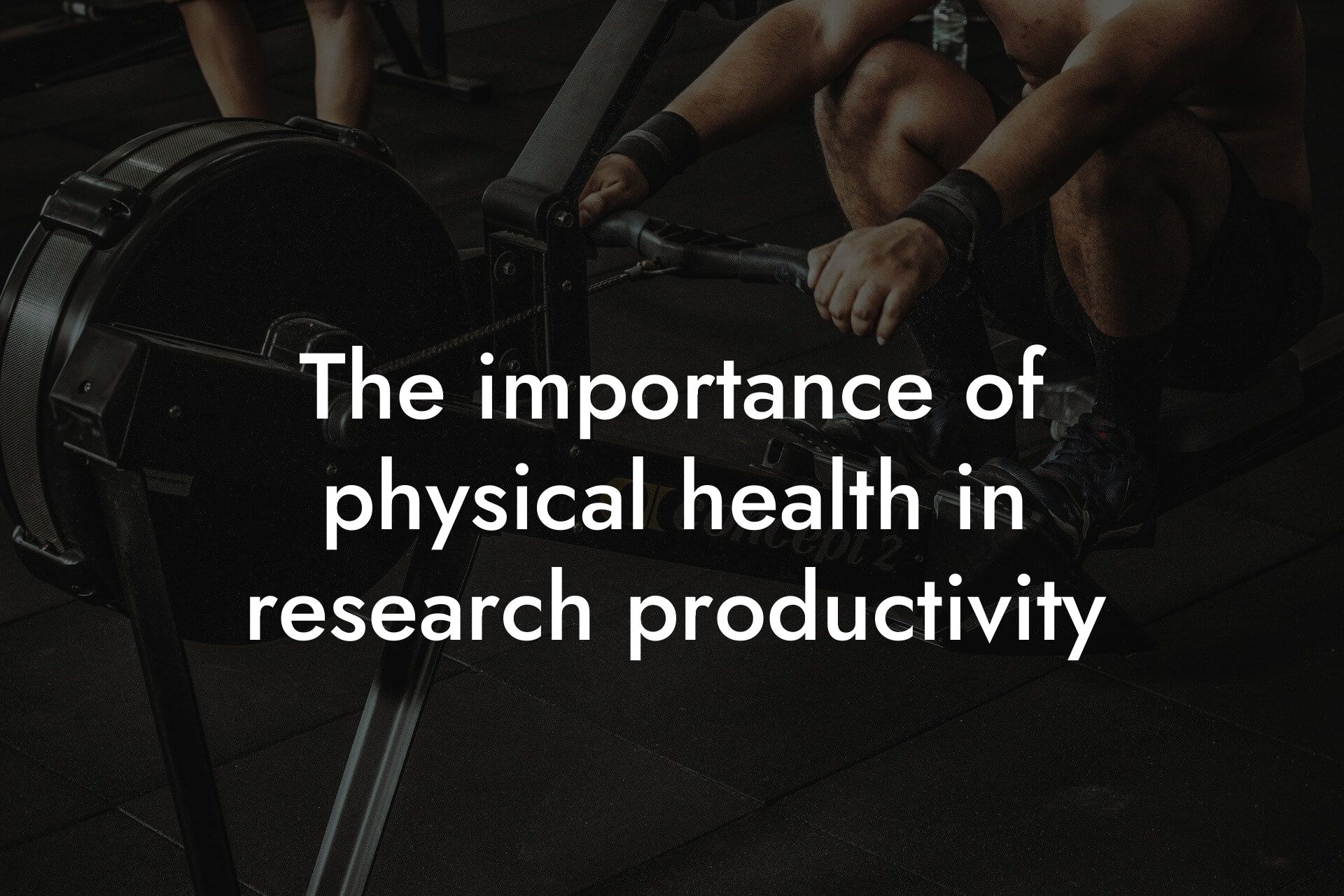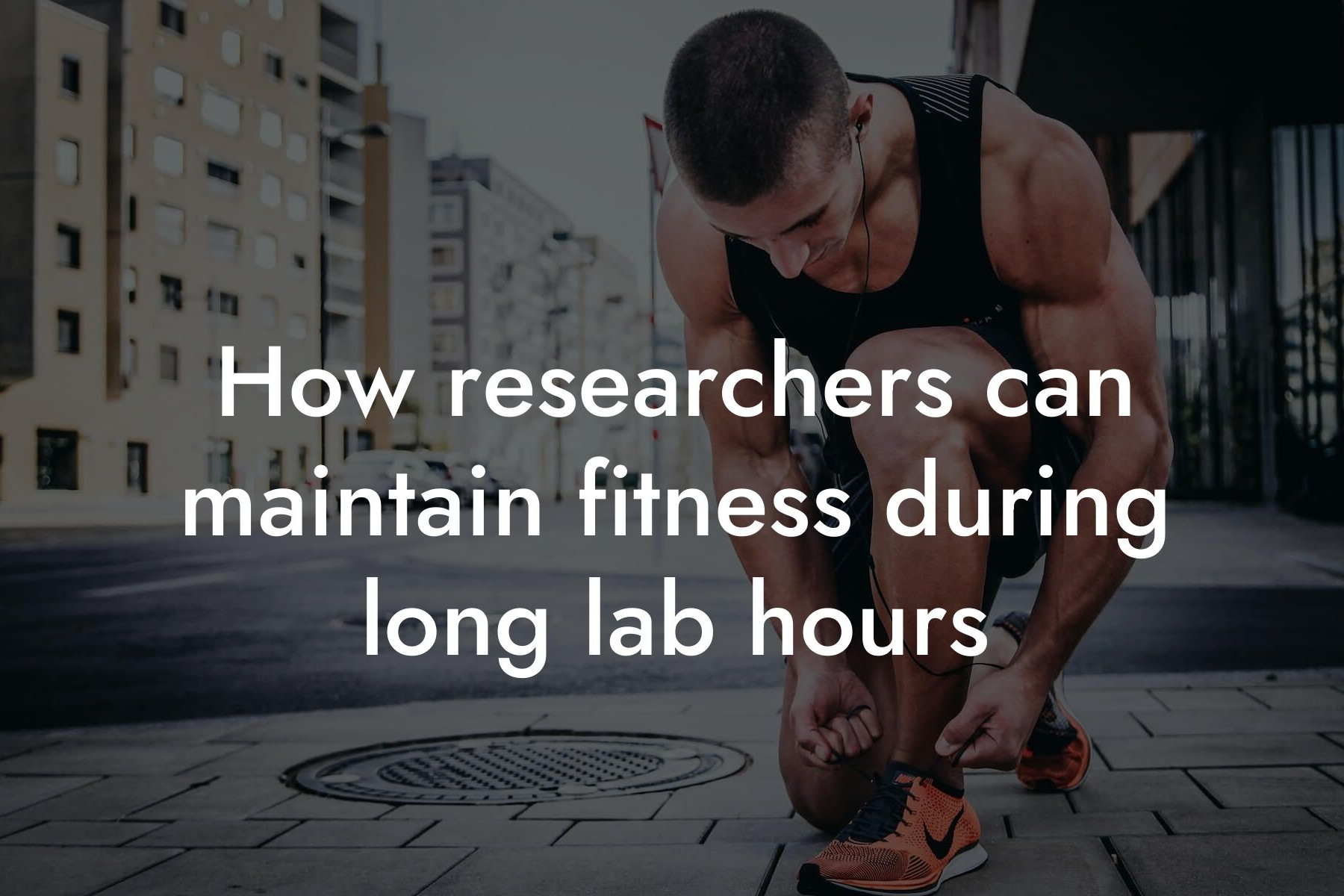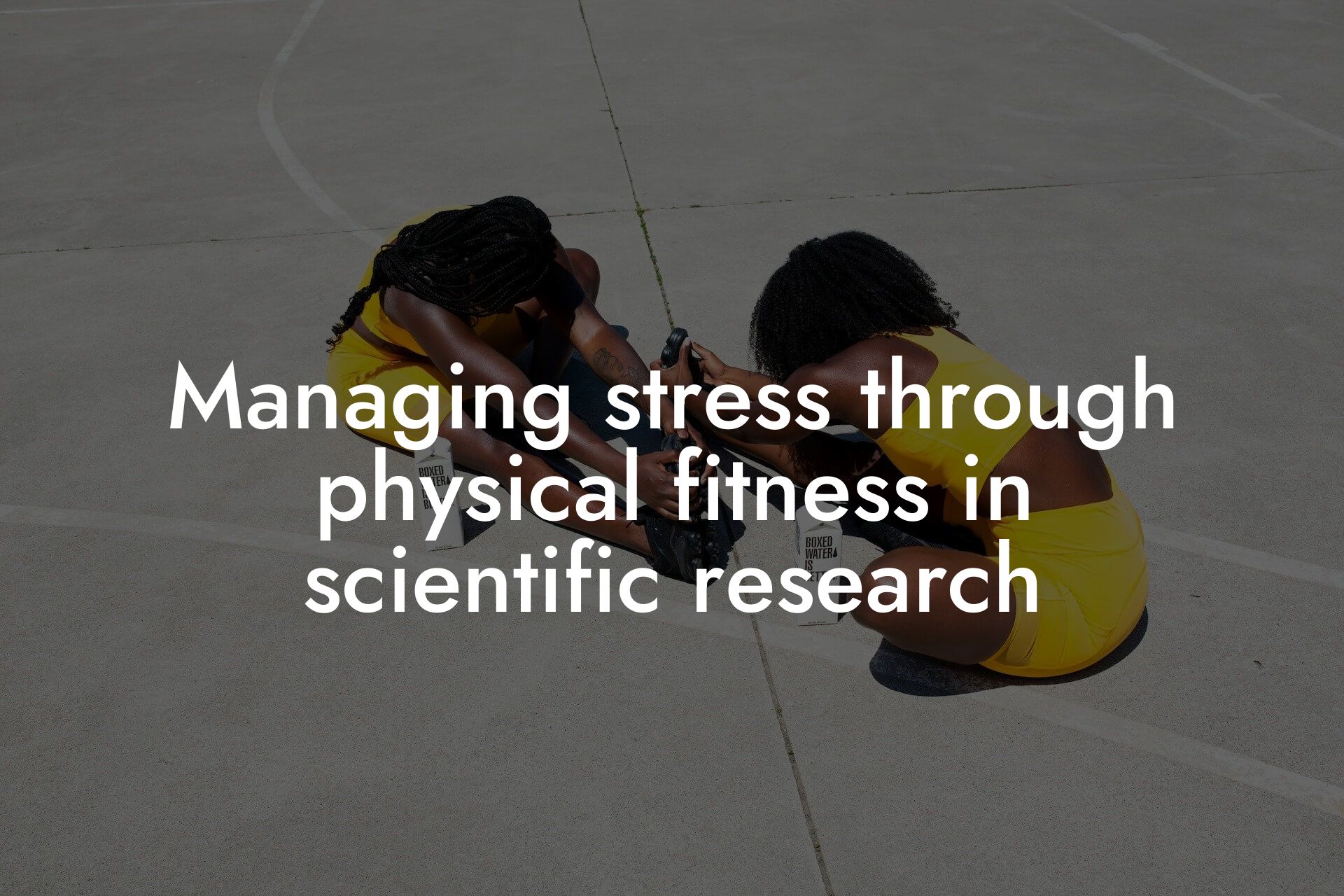As a high-earning professional, you understand the importance of maintaining a healthy physique and optimal body composition. However, sedentary research work can often get in the way of your fitness goals. Prolonged periods of sitting and inactivity can lead to weight gain, decreased muscle mass, and a decline in overall health. The good news is that with a few simple strategies and mindset shifts, you can stay active and healthy even during the most demanding research projects.
Table of Contents
The Risks of Sedentary Behavior
Sedentary behavior is a major risk factor for chronic diseases, including heart disease, type 2 diabetes, and certain types of cancer. When you're sedentary for extended periods, your body's metabolic rate slows down, and your muscles begin to atrophy. This can lead to a decrease in bone density, making you more susceptible to osteoporosis and fractures. Furthermore, sedentary behavior can negatively impact your mental health, causing anxiety, depression, and decreased productivity.
Why DEXA Scans Matter
At Tano Performance Group, we understand the importance of monitoring your body composition and bone density. Our DEXA scans provide a comprehensive assessment of your body, giving you valuable insights into your fat mass, lean mass, and bone density. By tracking these metrics, you can identify areas for improvement and make data-driven decisions to optimize your health and fitness.
Simple Exercises for Sedentary Researchers
You don't need to be a fitness enthusiast to stay active during sedentary research work. Here are some simple exercises you can do at your desk or during short breaks:
- Chair Squats: Stand up and sit down in your chair without using your hands. Repeat for 10-15 reps.
- Desk Push-Ups: Place your hands on your desk and do push-ups. Start with 5-10 reps and increase as you build strength.
- Leg Raises: Lift your legs off the floor and hold for 5-10 seconds. Repeat for 10-15 reps.
- Arm Circles: Hold your arms straight out to the sides and make small circles with your hands. Repeat for 5-10 reps.
Incorporating Movement into Your Daily Routine
In addition to desk exercises, there are several ways to incorporate movement into your daily routine:
- Take a walk during your lunch break or after dinner.
- Use a standing desk or adjustable desk to alternate between sitting and standing.
- Take the stairs instead of the elevator.
- Do a few jumping jacks or stretch during commercial breaks while watching TV.
Creating a Schedule for Activity
One of the biggest challenges of staying active during sedentary research work is finding time. Here are some tips to help you create a schedule for activity:
- Set aside 30 minutes each day for physical activity, whether it's a walk, jog, or strength training.
- Break up your activity into shorter intervals, such as 10-15 minutes, to fit into your busy schedule.
- Schedule activity into your calendar, just as you would any other appointment.
- Find an accountability partner or workout buddy to help motivate you.
Staying Motivated and Tracking Progress
Staying motivated and tracking progress are crucial to maintaining an active lifestyle during sedentary research work. Here are some tips to help you stay on track:
- Set specific, measurable, and achievable fitness goals.
- Track your progress using a fitness tracker, journal, or mobile app.
- Celebrate small victories and milestones along the way.
- Reward yourself for reaching your goals, whether it's a massage, new workout gear, or a fun activity.
Staying active during sedentary research work requires creativity, discipline, and a willingness to make small changes to your daily routine. By incorporating simple exercises, movement, and activity into your daily routine, you can maintain a healthy physique, optimal body composition, and overall well-being. Remember to track your progress, stay motivated, and celebrate your successes along the way. With the right mindset and strategies, you can achieve your fitness goals and take your business to the next level.
Frequently Asked Questions
What are the risks associated with sedentary research work?
As a high-earning professional, you're likely no stranger to long hours spent sitting at a desk, pouring over research papers, and staring at screens. However, this sedentary lifestyle can come with serious risks to your physical and mental health, including obesity, diabetes, cardiovascular disease, and even depression. It's essential to take proactive steps to stay active and mitigate these risks.
How can I stay motivated to exercise when I'm already exhausted from work?
We get it – after a long day of research work, the last thing you might feel like doing is hitting the gym. However, exercise is a powerful energy-booster, and even small amounts can make a significant difference. Try breaking your workouts into shorter, more manageable sessions, and find activities you enjoy, so it doesn't feel like a chore. Remember, every bit counts, and even a short walk during your lunch break can be beneficial.
What are some exercises I can do at my desk?
You don't need to leave your desk to get moving! Try doing some chair squats, desk push-ups, or leg raises to get your blood flowing. You can also do some simple stretches, like shoulder rolls, neck stretches, and wrist extensions. These small movements can make a big difference in reducing the negative effects of sitting for long periods.
How can I prioritize exercise when I have a heavy workload?
We understand that your workload can be demanding, but exercise is not a luxury, it's a necessity. Try scheduling your workouts into your calendar, just as you would any other important task. Even small blocks of time, like 20-30 minutes, can be beneficial. Remember, exercise can actually improve your focus and productivity, so it's worth making time for.
What are some healthy snacks I can keep at my desk?
It's easy to get caught up in the temptation of junk food when you're working long hours, but keeping healthy snacks on hand can help you stay on track. Try keeping nuts, dried fruits, carrot sticks with hummus, or energy balls made with oats and nuts. Avoid sugary or processed snacks that can lead to energy crashes and decreased productivity.
How can I stay hydrated during long research sessions?
Dehydration can lead to decreased focus, headaches, and fatigue, so it's essential to drink plenty of water throughout the day. Try keeping a refillable water bottle at your desk, and aim to drink at least 8-10 glasses of water per day. You can also infuse your water with fruits or herbs for added flavor.
What are some tips for taking breaks during long research sessions?
Taking regular breaks can help you stay focused and avoid burnout. Try taking a 5-10 minute break every hour to stretch, move around, and rest your eyes. Use this time to do some jumping jacks, stretch your legs, or practice some deep breathing exercises.
How can I incorporate physical activity into my daily commute?
If you take public transportation to work, try getting off a stop earlier and walking the rest of the way. If you drive, park in a spot that's further away from the office and walk in. You can also try doing some stretching or yoga poses while you're waiting for your train or bus.
What are some exercises I can do during commercial breaks while watching TV?
You don't have to be at the gym to get a workout in! Try doing some jumping jacks, burpees, or mountain climbers during commercial breaks while watching TV. You can also do some strength training exercises, like bicep curls or tricep dips, using light weights or water bottles.
How can I stay active during the winter months when it's cold outside?
We get it – it can be tough to stay motivated to exercise when it's cold and dark outside. However, there are plenty of ways to stay active indoors. Try doing some bodyweight exercises, like squats, lunges, and push-ups, or invest in a fitness video subscription or online workout program.
What are some benefits of incorporating physical activity into my daily routine?
Incorporating physical activity into your daily routine can have a significant impact on your overall health and wellbeing. Regular exercise can help you maintain a healthy weight, improve your mood, increase your energy levels, and even reduce your risk of chronic diseases like heart disease and diabetes.
How can I track my physical activity levels?
Tracking your physical activity levels can help you stay motivated and see the progress you're making. Try using a fitness tracker, pedometer, or mobile app to track your daily activity levels. You can also set daily step goals for yourself and challenge yourself to meet them.
What are some exercises I can do with a desk job?
Just because you have a desk job doesn't mean you can't stay active! Try doing some desk exercises, like chair squats, desk push-ups, or leg raises. You can also do some stretching exercises, like shoulder rolls, neck stretches, and wrist extensions.
How can I make exercise a habit?
Making exercise a habit takes time and consistency. Try scheduling your workouts into your calendar, just as you would any other important task. Start small and gradually increase the intensity and duration of your workouts. Find an exercise buddy or accountability partner to help keep you motivated.
What are some tips for staying active during long periods of sitting?
Staying active during long periods of sitting is crucial for your overall health and wellbeing. Try taking regular breaks to stand up, stretch, and move around. You can also do some simple exercises, like toe taps, ankle circles, and wrist extensions, to keep your blood flowing.
How can I prioritize self-care during busy periods of research work?
Prioritizing self-care during busy periods of research work is essential for your overall health and wellbeing. Try scheduling self-care activities, like exercise, meditation, or reading, into your calendar. Make time for activities that bring you joy and help you relax.
What are some healthy meal prep ideas for busy professionals?
Meal prep can be a game-changer for busy professionals. Try preparing healthy meals in advance, like salads, soups, or stir-fries, and portioning them out into individual containers. You can also prep healthy snacks, like energy balls or trail mix, to keep at your desk.
How can I stay motivated to exercise when I don't see immediate results?
We get it – it can be tough to stay motivated to exercise when you don't see immediate results. However, exercise is a long-term investment in your health and wellbeing. Focus on the progress you're making, no matter how small, and celebrate your successes along the way.
What are some tips for staying active during travel?
Staying active during travel can be challenging, but it's not impossible! Try packing a portable workout kit, like resistance bands or a jump rope, and doing some exercises in your hotel room. You can also explore your surroundings and find local parks or gyms to get a workout in.
How can I incorporate physical activity into my daily routine with a busy schedule?
Incorporating physical activity into your daily routine with a busy schedule requires creativity and flexibility. Try breaking your workouts into shorter, more manageable sessions, and finding activities you can do during commercial breaks or while waiting in line.
What are some benefits of high-intensity interval training (HIIT) for busy professionals?
HIIT is a great option for busy professionals because it's quick, effective, and can be done anywhere. HIIT involves short bursts of high-intensity exercise followed by brief periods of rest. This type of exercise has been shown to improve cardiovascular health, increase caloric burn, and boost energy levels.
How can I make healthy choices when eating out?
Making healthy choices when eating out can be challenging, but it's not impossible! Try opting for grilled or baked options, choosing smaller portions, and avoiding fried or processed foods. You can also ask your server for healthy recommendations or modifications.
What are some tips for staying active during the holiday season?
The holiday season can be a challenging time to stay active, but it's not impossible! Try scheduling your workouts into your calendar, finding workout buddies to keep you motivated, and incorporating physical activity into your holiday traditions, like going for a walk after dinner.
How can I prioritize my physical health when I'm under a lot of stress?
Prioritizing your physical health when you're under a lot of stress is crucial for your overall wellbeing. Try incorporating stress-reducing activities, like yoga or meditation, into your daily routine. Make time for physical activity, like a brisk walk or jog, to help reduce stress and anxiety.
Here are some related articles you might love...
- The importance of physical health in research productivity
- How researchers can maintain fitness during long lab hours
- Managing stress through physical fitness in scientific research
- The impact of body composition on cognitive function in research
- Quick workouts for researchers during lab breaks
- Balancing lab work with personal fitness goals
- Nutrition strategies for maintaining focus during experiments
- The role of physical fitness in preventing research-related injuries
- How DEXA scans can benefit scientists and researchers
Zak Faulkner
Zak Faulkner is a leading authority in the realm of physical health and body composition analysis, with over 15 years of experience helping professionals optimise their fitness and well-being. As one the experts behind Tano Performance Group, Zak has dedicated his career to providing in-depth, science-backed insights that empower clients to elevate their physical performance and overall health.
With extensive knowledge of DEXA technology, Zak specializes in delivering comprehensive body assessments that offer precise data on body fat, muscle mass, bone density, and overall physique. His expertise enables individuals to make informed decisions and achieve their fitness goals with accuracy and confidence. Zak’s approach is rooted in a deep understanding of human physiology, combined with a passion for helping clients unlock their full potential through personalised strategies.
Over the years, Zak has earned a reputation for his commitment to excellence, precision, and client-focused service. His guidance is trusted by top professionals who demand the best when it comes to their health. Whether advising on fitness programs, nutritional strategies, or long-term wellness plans, Zak Faulkner’s insights are a valuable resource for anyone serious about taking their health and fitness to the next level.
At Tano Performance Group, Zak continues to lead our Content Team revolutionising how professionals approach their physical health, offering unparalleled expertise that drives real results.




